Poems by Thomas Merton
Marian Poems by Thomas Merton
– Father Johann Roten, S.M.
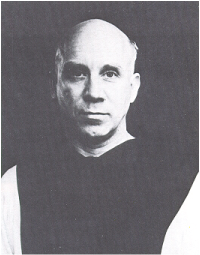
Thomas Merton (1915-1968), Trappist monk and priest is recognized as one of the major spiritual fathers of our times. His longing for silence and solitude, his contemplative vision, his engagement with need for world peace through inner life of the spirit, his journey across religious traditions, cultures and disciplines, make him a man for all times but especially for our own. Thomas Merton expressed this vision in his poetry, novels, essays, devotionals, and autobiographical writings.
Statistical Analysis of Merton's Marian Poems
We can make some remarks about the distribution and frequency of Merton's poems. First, let's take a look at the distribution of Merton's Marian poems as they relate to the years of his life. Between 1940-1949, Merton wrote twenty-five poems which have a Marian content or theme. Between 1950-1959, Merton wrote one poem that has Marian aspects. Between 1960 and 1968, Merton wrote five poems that have Marian aspects. The last poem that Merton wrote (that has Marian aspects) is called Queen's Tunnel . Now, let's take a look at the frequency of Merton's poems per year. The most poems that Merton ever wrote about Mary in a year was eight, which he did twice. He wrote eight poems in 1944 and 1946 which have Marian aspects. In 1947, Merton wrote five poems that have Marian aspects. This means that twenty-one of the twenty-nine poems that he wrote (which have Marian aspects) were written in a time span of four years. We can refer to ten of the twenty-nine poems as "totally" Marian. Eight of the ten poems were written in the 1940's: La Comparsa En Oriente, Song for Our Lady of Cobre, The Evening of the Visitation, The Blessed Virgin Mary Compared to a Window, Aubade: The Annunciation, La Salette, Canticle for the Blessed Virgin, and To the Immaculate Virgin on a Winter Night. The two exceptions are The Annunciation (which Merton wrote in 1957) and Hagia Sophia (which Merton wrote in 1963). Conclusion: We can conclude from this evidence that the mid 1940's were the time span in which Merton most felt moved to praise Mary through the art form of poetry.
We present to you this collection of poems honoring the Virgin Mary written by Thomas Merton. See the end of this page for Thomas Merton in Photographs.
The Blessed Virgin Mary Compared to a Window
The Evening of the Visitation
Song for Our Lady of Cobre
The Candlemas Procession
Cana
La Salette
Duns Scotus
Evening: Zero Weather
The Flight to Egypt
The Messenger
Winter's Night
Hagia Sophia
La Comparsa En Oriente
The Holy Child's Song
Aubade: The Annunciation
Advent
Carol
Rehab's House
Landscape: Wheatfields
Canticle for the Blessed Virgin
Songs of Experience; India, One
Death
A Christmas Card
The Quickening of St. John the Baptist
The Annunciation
To the Immaculate Virgin, On a Winter Night
The Blessed Virgin Mary Compared to a Window
Because my will is simple as a window
And knows no pride of original birth,
It is my life to die, like glass, by light:
Slain in the strong rays of the bridegroom sun.
Because my love is simple as a window
And knows no shame of original dust,
I longed all night, (when I was visible) for dawn my death:
When I would marry day, my Holy Spirit:
And die by transsubstantiation into light.
For light, my lover, steals my life in secret.
I vanish into day, and leave no shadow
But the geometry of my cross,
Whose frame and structure are the strength
By which I die, but only to the earth,
And am uplifted to the sky my life.
When I became the substance of my lover,
(Being obedient, sinless glass)
I love all things that need my lover's life,
And live to give my newborn Morning to your quiet rooms,
-Your rooms, that would be tombs,
Or vaults of night, and death, and terror,
Fill with the clarity of living Heaven,
Shine with the rays of God's Jerusalem:
O shine, bright Sions!
Because I die by brightness and the Holy Spirit,
The sun rejoices in your jail, my kneeling Christian,
(Where even now you weep and grin
To learn, from my simplicity, the strength of faith).
Therefore do not be troubled at the judgements of the thunder,
Stay still and pray, still stay, my other son,
And do not fear the armies and black ramparts
Of the advancing and retreating rains:
I'll let no lightning kill your room's white order.
Although it is the day's last hour,
Look with no fear:
For the torn storm lets in, at the world's rim,
Three streaming rays as straight as Jacob's ladder:
And you shall see the sun, my Son, my Substance,
Come to convince the world of the day's end, and of the night,
Smile to the lovers of the day in smiles of blood;
For though my love, He'll be their Brother,
My light - the Lamb of their Apocalypse.
Go, roads, to the four quarters of our quiet distance,
While you, full moon, wise queen,
Begin your evening journey to the hills of heaven,
And travel no less stately in the summer sky
Than Mary, going to the house of Zachary.
The woods are silent with the sleep of doves,
The valleys with the sleep of streams,
And all our barns are happy with peace of cattle gone to rest.
Still wakeful, in the fields, the shocks of wheat
Preach and say prayers:
You sheaves, make all your evensongs as sweet as ours,
Whose summer world, all ready for the granary and barn,
Seems to have seen, this day,
Into the secret of the Lord's Nativity.
Now at the fall of night, you shocks,
Still bend your heads like kind and humble kings
The way you did this golden morning when you saw God's
Mother passing,
While all our windows fill and sweeten
With the mild vespers of the hay and barley.
You moon and rising stars, pour on our barns and houses
Your gentle benedictions.
Remind us how our Mother, with far subtler and more holy
influence,
Blesses our rooves and eaves,
Our shutters, lattices and sills,
Our doors, and floors, and stairs, and rooms, and bedrooms,
Smiling by night upon her sleeping children:
O gentle Mary! Our lovely Mother in heaven!
The white girls lift their heads like trees,
The black girls go
Reflected like flamingoes in the street.
The white girls sing as shrill as water,
The black girls talk as quiet as clay.
The white girls open their arms like clouds,
The black girls close their eyes like wings:
Angels bow down like bells,
Angels look up like toys,
Because the heavenly stars
Stand in a ring:
And all the pieces of the mosaic, earth,
Get up and fly away like birds.
Lumen
Ad revelationem gentium.
Look kindly, Jesus, where we come,
New Simeons, to kindle,
Each at Your infant sacrifice his own life's candle.
And when Your flame turns into many tongues,
See how the One is multiplied, among us, hundreds!
And goes among the humble, and consoles our sinful
kindred.
It is for this we come,
And, kneeling, each receive one flame:
Ad revelationem gentium.
Our lives, like candles, spell this simple symbol:
Weep like our bodily life, sweet work of bees,
Sweeten the world, with your slow sacrifice.
And this shall be our praise:
That by our glad expense, our Father's will
Burned and consumed us for a parable.
Nor burn we now with brown and smoky flames, but
bright
Until our sacrifice is done,
(By which not we, but You are known)
And then, returning to our Father, one by one,
Give back our lives like wise and waxen lights.
Once when our eyes were clean as noon, our rooms
Filled with the joys of Cana's feast:
For Jesus came, and His disciples, and His Mother,
And after them the singers
And some men with violins.
Once when our minds were Galilees,
And clean as skies our faces,
Our simple rooms were charmed with sun.
Our thoughts went in and out in whiter coats than
God's disciples',
In Cana's crowded rooms, at Cana's tables.
Nor did we seem to fear the wine would fail:
For ready, in a row, to fill with water and a miracle,
We saw our earthen vessels, waiting empty.
What wine those humble waterjars foretell!
Wine for the ones who, bended to the dirty earth,
Have feared, since lovely Eden, the sun's fire,
Yet hardly mumble, in their dusty mouths, one prayer.
Wine for old Adam, digging in the briars!
It is a hundred years since your shy feet
Ventured to stand upon the pasture grass of the high
Alps,
Coming no deeper in our smoky atmosphere
Than these blue skies, the mountain eyes
Of the two shepherd children, young as flowers,
Born to be dazzled by no mortal snow.
Lady, it is a hundred years
Since those fair, terrible tears
Reproved, with their amazing grief
All the proud candor of those altitudes:
Crowning the flowers at your feet
With diamonds, that seized upon, transfigured into
nails of light
The rays of the mountain sun!-
And by their news,
(Which came with cowbells to the evening village
And to the world with church-bells
After not too many days,)
And by their news
We thought the walls of all hard hearts
Had broken down, and given in,
Poured out their dirty garrisons of sin,
And washed the streets with our own blood, if need
be -
- Only to have them clean!
And though we did not understand
The weight and import of so great a sorrow,
We never thought so soon to have seen
The loss of its undying memory,
Passing from the black world without a word,
Without a funeral!
For while our teeth were battling in the meat of
miracles and favors,
Your words, your prophecies, were all forgotten!
Now, one by one,
The things you said
Have come to be fulfilled.
John, in the might of his Apocalypse, could not fore-
tell
Half of the story of our monstrous century,
In which the arm of your inexorable Son,
Bound, by His Truth, to disavow your intercession
For this wolf-world, this craven zoo,
Has bombed the doors of hell clean off their hinges,
And burst the cage of antichrist,
And roused, with His first two great thunderbolts,
The chariots of Armageddon.
Striking like lightning to the quick of the real world
Scotus has mined all ranges to their deepest veins:
But where, oh, on what blazing mountain of theology
And in what Sinai's furnace
Did God refine the gold?
Who ruled those arguments in their triumphant order
And armed them with their strict celestial light?
See the lance-lightning, blade-gliter, banner-progress
As love advances, company by company
In sunlit teams his clean embattled reasons,
Until the firmament, with high heavenly marvel
Views in our crystal souls her blue embodiment,
Unfurls a thousand flags above our heads -
It is the music of Our Lady's army!
For Scotus is her theologian,
Nor has there ever been a braver chivalry than his
precision.
His thoughts are skies of cloudless peace
Bright as the vesture of her grand aurora
Filled with the rising Christ.
But we, a weak, suspicious generation,
Loving emotion, hating prayer,
We are not worthy of his wisdom.
Creeping like beasts between the mountain's feet
We look for laws in the Arabian dust.
We have no notion of his freedom
Whose acts despise the chains of choice and passion.
We have no love for his beautitude
Whose act renounces motion:
Whose love flies home forever
As silver as felicity,
Working and quiet in the dancelight of an everlasting
arrow.
Lady, the image of whose heaven
Sings in the might of Scotus' reasoning:
There is no line of his that has not blazed your glory
in the schools,
Though in dark words, without romance,
Calling us to swear you our liege.
Language was far too puny for his great theology:
But, oh! His thought strode through those words
Bright as the conquering Christ
Between the clouds His enemies:
And in the clearing storm and Sinai's dying thunder
Scotus comes out, and shakes his golden locks
And sings like the African sun.
Now the lone world is streaky as a wall of marble
With veins of clear and frozen snow.
There is no bird song there, no hare's track
No badger working in the russet grass:
All the bare fields are silent as eternity.
And the whole herd is home in the long barn.
The brothers come, with hoods about their faces,
Following their plumes of breath
Lugging the gleaming buckets one by one.
This was a day when shovels would have struck
Full flakes of fire out of the land like rock:
And ground cries out like iron beneath our boots
When all the monks come in with eyes as clean as the
cold sky
And axes under their arms,
Still paying out Ave Marias
With rosaries between their bleeding fingers.
We shake the chips out of our robes outside the door
And go to hide in cowls as deep as clouds,
Bowing our shoulders in the church's shadow, lean
and whipped,
To wait upon your Vespers, Mother of God!
And we have eyes no more for the dark pillars or the
freezing windows,
Ears for the rumorous cloister or the chimes of time
above our heads:
For we are sunken in the summer of our adoration,
And plunge, down, down into the fathoms of our
secret joy
That swims with indefinable fire.
And we will never see the copper sunset
Linger a moment, like an echo, on the frozen hill
Then suddenly die an hour before the Angelus.
For we have found our Christ, our August
Here in the zero days before Lent -
We are already binding up our sheaves of harvest
Beating the lazy liturgy, going up with exultation
Even on the eve of our Ash Wednesday,
And entering our blazing heaven by the doors of the
Assumption!
Through every precinct of the wintry city
Squadroned iron resounds upon the streets;
Herod's police
Make shudder the dark steps of the tenements
At the business about to be done.
Neither look back upon Thy starry country,
Nor hear what rumors crowd across the dark
Where blood runs down those holy walls,
Nor frame a childish blessing with Thy hand
Towards that fiery spiral of exulting souls!
Go, Child of God, upon the singing desert,
Where, with eyes of flame,
The roaming lion keeps thy road from harm.
There is some sentry at the rim of winter
Fed with the speech the wind makes
In the grand belfries of the sleepless timber.
He understands the lasting strife of tears,
And the way the world is strung;
He waits to warn all life with the tongue of March's
bugle,
Of the coming of the warrior sun.
When spring has garrisoned up her army of water,
A million grasses leave their tents, and stand in rows
To see their invincible brother.
Mending the winter's ruins with their laughter,
The flowers go out to their undestructive wars.
Walk in the woods and be witnesses,
You, the best of these poor children.
When Gabriel hit the bright shore of the world,
Yours were the eyes saw some
Star-sandalled stranger walk like lightning down the
air,
The morning the Mother of God
Loved and dreaded the message of an angel.
When, in the dark, the frost cracks on the window
The children awaken, and whisper.
One says the moonlight grated like a skate
Across the freezing river.
Another hears the starlight breaking like a knifeblade
Upon the silent, steelbright pond.
They say the trees are stiller than the frozen water
From waiting for a shouting light, a heavenly message.
Yet it is far from Christmas, when a star
Sang in the pane, as brittle as their innocence!
For now the light of early Lent
Glitters upon the icy step -
"We have wept letters to our patron saints,
(The children say) yet slept before they ended."
Oh, is there in this night no sound of strings, of singers!
None coming from the wedding, no, nor
Bridegroom's messenger?
(The sleepy virgins stir, and trim their lamps.)
The moonlight rings upon the ice as sudden as a
footstep;
Starlight clinks upon the dooryard stone, too like a
latch,
And the children are again, awake,
And all call out in whispers to their guardian angels.
I. Dawn. The Hour of Lauds.
There is in all visible things an invisible fecundity, a
dimmed light, a meek namelessness, a hidden whole-
ness. This mysterious Unity and Integrity is Wisdom,
the Mother of all, Natura naturans. There is in all
things an inexhaustible sweetness and purity, a silence
that is a fount of action and joy. It rises up in word-
less gentleness and flows out to me from the unseen
roots of all created being, welcoming me tenderly,
saluting me with indescribable humility. This is at
once my own being, my own nature, and the Gift of
my Creator's Thought and Art within me, speaking
as Hagia Sophia, speaking as my sister, Wisdom.
I am awakened, I am born again at the voice of this,
my Sister, sent to me from the depths of the divine
fecundity.
Let us suppose I am a man lying asleep in a hospital.
I am indeed this man lying asleep. It is July the second,
the Feast of Our Lady's Visitation. A Feast of Wisdom.
At five-thirty in the morning I am dreaming in a very
quiet room when a soft voice awakens me from my
dream. I am like all mankind awakening from all the
dreams that ever were dreamed in all the nights of the
world. It is like the One Christ awakening in all the
separate selves that ever were separate and isolated
and alone in all the lands of the earth. It is like all minds
coming back together into awareness from all distractions,
cross-purposes and confusions, into unity of love. It is like
the first morning of the world (when Adam, at the sweet voice
of Wisdom awoke from nonentity and knew her), and like the Last
Morning of the world when all the fragments of Adam will return from
death at the voice of Hagia Sophia, and will know where they stand.
Such is the awakening of one man, one morning, at
the voice of a nurse in the hospital. Awakening out
of languor and darkness, out of helplessness, out of
sleep, newly confronting reality and finding it to be
gentleness.
It is like being awakened by Eve. It is like being
awakened by the Blessed Virgin. It is like coming
forth from primordial nothingness and standing in
clarity, in Paradise.
In the cool hand of the nurse there is the touch of all
life, the touch of Spirit.
Thus Wisdom cries out to all who will hear (Sapientia
clamitat in plateis) and she cries out particularly
to the little, to the ignorant and the helpless.
Who is more little, who is more poor than the helpless
man who lies asleep in his bed without awareness and
without defense? Who is more trusting than
he who must entrust himself each night to sleep?
What is the reward of his trust? Gentleness comes to
him when he is most helpless and awakens him,
refreshed, beginning to be made whole. Love takes him
by the hand, and opens to him the doors of another
life, another day.
(But he who has defended himself, fought for himself
in sickness, planned for himself, guarded himself, loved
himself alone and watched over his own life all night, is
killed at last by exhaustion. For him there is no newness.
Everything is stale and old.)
When the helpless one awakens strong as the voice of
mercy, it is as if Life his Sister, as if the Blessed Virgin,
(his own flesh, his own sister), as if Nature made wise
by God's Art and Incarnation were to stand over him and
invite him with unutterable sweetness to be awake and to
live. This is what it means to recognize Hagia Sophia.
II. Early Morning. The Hour of Prime.
O blessed, silent one, who speaks everywhere!
We do not hear the soft voice, the gentle voice, the
merciful and feminine.
We do not hear mercy, or yielding love, or non-resistance,
or non-reprisal. In her there are no reasons and no answers.
Yet she is the candor of God's light, the expression of His
simplicity.
We do not hear the uncomplaining pardon that bows
down the innocent visages of flowers to the dewy
earth. We do not see the Child who is prisoner in all
the people, and who says nothing. She smiles, for
though they have bound her, she cannot be a prisoner.
Not that she is strong, or clever, but simply that
she does not understand imprisonment.
The helpless one, abandoned to sweet sleep, him the
gentle one will awake: Sophia.
All that is sweet in her tenderness will speak to him
on all sides in everything, without ceasing, and he
will never be the same again. He will have awakened
not to conquest and dark pleasure but to the impeccable
pure simplicity of One consciousness in all and through all:
one Wisdom, one Child, one Meaning, one Sister.
The stars rejoice in their setting, and in the rising of
the Sun. The heavenly lights rejoice in the going
forth of one man to make a new world in the morning,
because he has come out of the confused primordial dark
night into consciousness. He has expressed the clear silence
of Sophia in his own heart. He has become eternal.
III. High Morning. The Hour of Tierce.
The Sun burns in the sky like the Face of God, but
we do not know his countenance as terrible. His light
is diffused in the air and the light of God is diffused
by Hagia Sophia.
We do not see the Blinding One in black emptiness.
He speaks to us gently in ten thousand things, in
which His light is one fullness and one Wisdom.
Thus He shines not on them but from within them.
Such is the loving-kindness of Wisdom.
All the perfections of created things are also in God;
and therefore He is at once Father and Mother. As
Father He stands in solitary might surrounded by
darkness. As Mother His shining is diffused, embracing
all His creatures with merciful tenderness and light.
The Diffuse Shining of God is Hagia Sophia.
We call her His "glory." In Sophia His power is
experienced only as mercy and as love.
(When the recluses of fourteenth-century England
heard their Church Bells and looked out upon the
wolds and fens under a kind sky, they spoke in their
hearts to "Jesus our Mother." It was Sophia that had
awakened in their childlike hearts.)
Perhaps in a certain very primitive aspect Sophia is
the unknown, the dark, the nameless Ousia. Perhaps
she is even the Divine Nature, One in Father, Son, and
Holy Ghost. And perhaps she is in infinite light unmanifest,
not even waiting to be known as Light. This I do not know.
Out of the silence Light is spoken. We do not hear it or see
it until it is spoken.
In the Nameless Beginning, without Beginning, was
the Light. We have not seen this Beginning. I do not know
where she is, in this Beginning. I do not speak of her as a
Beginning, but as a manifestation.
Now the Wisdom of God, Sophia, comes forth, reaching
from "end to end mightily." She wills to be also
the unseen pivot of all nature, the center and significance
of all the light that is in all and for all. That which is poorest
and humblest, that which is most hidden in all things is
nevertheless most obvious in them, and quite manifest, for it
is their own self that stands before us, naked and without care.
Sophia, the feminine child, is playing in the world,
obvious and unseen, playing at all times before the Creator.
Her delights are to be with the children of men. She is their sister.
The core of life that exists in all things is tenderness, mercy, virginity
the Light, the Life considered as passive, as received, as given, as
taken, as inexhaustibly renewed by the Gift of God. Sophia is
Gift, is Spirit, Donum Dei. She is God-given and God
Himself as Gift. God as all, and God reduced to Nothing:
inexhaustible nothingness. Exinanivit semetipsum. Humility as
the source of unfailing light.
Hagia Sophia in all things is the Divine Light reflected in them,
considered as a spontaneous participation, as their invitation
to the Wedding Feast.
Sophia is God's sharing of Himself with creatures. His outporing,
and the Love by which He is given, and known, held and loved.
She is in all things like the air receiving the sunlight. In her
they prosper. In her they glorigy God. In her they rejoice to reflect
Him. In her they are united with him. She is the union between them.
She is the Love that unites them. She is life as communion, life as
thanksgiving, life as praise, life as festival, life as glory.
Because she receives perfectly there is in her no stain.
She is love without blemish, and gratitude without
self-complacency. All things praise her by being themselves
and by sharing in the Wedding Feast. She is the Bride and the
Feast and the Wedding.
The feminine principle in the world is the inexhaustible source
of creative realizations of the Father's glory. She is His
manifestation in radiant splendor! But she remains unseen,
glimpsed only by a few. Sometimes there are none who
know her at all.
Sophia is the mercy of God in us. She is the tenderness
with which the infinitely mysterious power of pardon
turns the darkness of our sins into the light of grace.
She is the inexhaustible fountain of kindness, and would
almost seem to be, in herself, all mercy. So she does in us
a greater work than that of Creation: the work of new being
in grace, the work of pardon, the work of transformation from
brightness to brightness tamquam a Domini Spiritu. She
is in us the yielding and tender counterpart of the power, justice
and creative dynamism of the Father.
IV. Sunset. The Hour of Compline. Salve Regina.
Now the Blessed Virgin Mary is the one created being
who enacts and shows forth in her life all that is hidden in Sophia.
Because of this she can be said to be a personal manifestation
of Sophia, Who in God is Ousia rather than Person.
Natura in Mary becomes pure Mother. In her, Natura
is as she was from the origin from her divine birth. In Mary Natura
is all wise and is manifested as an all-prudent, all-loving, all-pure person:
not a Creator, and not a Redeemer, but perfect Creature, perfectly
Redeemed, the fruit of all God's great power, the perfect expression
of wisdom in mercy.
It is she, it is Mary, Sophia, who in sadness and joy, with the full awareness
of what she is doing, sets upon the Second Person, the Logos, a crown
which is His Human Nature. Thus her consent opens the door of created
nature, of time, of history, to the Word of God.
God enters into His creation. Through her wise answer, through her obedient
understanding, through the sweet yielding consent of Sophia, God enters
without publicity into the city of rapacious men.
She crowns Him not with what is glorious, but with
what is greater than glory: the one thing greater than
glory is weakness, nothingness, poverty.
She sends the infinitely Rich and Powerful One forth
as poor and helpless, in His mission of inexpressible
mercy, to die for us on the Cross.
The shadows fall. The stars appear. The birds begin to sleep.
Night embraces the silent half of the earth. A vagrant, a destitute
wanderer with dusty feet, finds his way down a new road. A
homeless God, lost in the night, without papers, without
identifications, without even a number, a frail expendable exile
lies down in desolation under the sweet stars of the world and
entrusts Himself to sleep.
Drums of the early evening wake
The mountain full of ore, and the canebrake.
Up at Cobre tall tambores call
One who rings gangarias with a nail,
One with feathers for sleeves,
One whose arms are birds,
One with a mouth full of great fires
And lights instead of words.
One with a tobacco leaf hat
Rings his drum like a bell,
And brings the saints of heaven, with claves,
Down from the starlit hill;
A black angel beats an ass's jaw
And (tick tick) a white the claves
While the sodality of the blessed virgin
Follow after, carrying flowers.
Five angels beating bongos,
Seven saints ringing their bells,
Wear coats made out of paper money
And shoes made out of shells.
They clatter like a box of nickels,
Holding candle towers, on fire:
They whirl these as solemn as wise men,
Paper temples in the air.
Lights fly like birds behind the cane
And shot flies after, but in gourds,
When the comparsa goes off to the plains
With fires in her mouth, but now words:
For ten angels ring gangarias
When the comparsa goes away
With all the mountain people and pilgrims
Dancing down to Camaguey.
The pray for us, Mother of Jesus,
Caridad, Merced,
Queen of Cobre and of the three towers
That watch over Camaguey :
The ten angels are playing gangarias
And the comparsa goes away.
When midnight occupied the porches of the Poet's reason
Sweeter than any bird
He heard the Holy Child.
Song
"When My kind Father, kinder than the sun,
With looks and smiles bends down
And utters My bodily life,
My flesh, obeying, praises Heaven like a smiling cloud.
Then I become the laughter of the watercourses.
I am the gay wheat fields, the serious hills:
I fill the sky with words of light, and My incarnate songs
Fly in and out the branches of My childish voice
Like thrushes in a tree.
"And when My Mother, pretty as a church,
Takes Me upon her lap, I laugh with love,
Loving to live in her flesh, which is My house and full of
light!
(Because the sky My Spirit enters in at all the windows)
O, then what songs and what incarnate joys
Dance in the brightest rays of My childish voice!
"In winter when the birds put down their flutes
And wind plays sharper than a fife upon the icy rain,
I sit in this crib,
And laugh like fire, and clap My golden hands:
To view my friends the timid beasts-
Their great brown flanks, muzzles and milky breath!
"Therefore come, shepherds, from your rocky hill,
And bend about My crib in wonder and adore My joy.
My glances are as good as wine.
The little rivers of My smile
Will wash away all ruins from your eyes,
As I lift up My hands,
As white as blackthorn blossoms,
And charm and kiss you with My seven sacraments.
"This seeming winter is your spring
When skies put off their armor:
Because My Heart already holds
The secret mortal wound,
By which I shall transform all deserts into garden-ground:
And there the peaceful trees,
All day say credos, being full of leaves -
And I will come and be your noon-day sun,
And make your shadows palaces of moving light:
And you will show Me your flowers."
When the midnight occupied the porches of the Poet's reason
Sweeter than any bird
He heard the Holy Child.
When the dim light, at Lauds, comes strike her window,
Bellsong falls out of Heaven with a sound of glass.
Prayers fly in the mind like larks,
Thoughts hide in the height like hawks:
And while the country churches tell their blessings to the
distance,
Her slow words move
(Like summer winds the wheat) her innocent love:
Desires glitter in her mind
Like morning stars:
Until her name is suddenly spoken
Like a meteor falling.
She can no longer hear shrill day
Sing in the east,
Nor see the lovely woods begin to toss their manes.
The rivers have begun to sing.
The little clouds shine in the sky like girls:
She has no eyes to see their faces.
Speech of an angel shines in the waters of her thought
like diamonds,
Rides like a sunburst on the hillsides of her heart.
And is brought home like harvests,
Hid in her house, and stored
Like the sweet summer's riches in our peaceful barns.
But in the world of March outside her dwelling,
The farmers and the planters
Fear to begin their sowing, and its lengthy labor,
Where, on the brown, bare furrows,
The winter wind still croons as dumb as pain.
Charm with your stainlessness these winter nights,
Skies, and be perfect! Fly, vivider in the fiery dark, you quiet meteors,
And disappear.
You moon, be slow to go down,
This is your full!
The four white roads make off in silence
Towards the four parts of the starry universe.
Time falls like manna at the corners of the wintry earth.
We have become more humble than the rocks,
More wakeful than the patient hills.
Charm with your stainlessness these nights in Advent,
holy spheres,
While minds, as meek as beasts,
Stay close at home in the sweet hay;
And intellects are quieter than the flocks that feed by starlight.
Oh pour your darkness and your brightness over all our
solemn valleys,
You skies: and travel like the gentle Virgin,
Toward the planets' stately setting,
Oh white full moon as quiet as Bethlehem!
Flocks feed by darkness with a noise of whispers,
In the dry grass of pastures,
And lull the solemn night with their weak bells.
The little towns upon the rocky hills
Look down as meek as children:
Because they have seen come this holy time.
God's glory, now, is kindled gentler than low candlelight
Under the rafters of a barn:
Eternal Peace is sleeping in the hay,
And Wisdom's born in secret in a straw-roofed stable.
And O! Make holy music in the stars, you happy angels.
You shepherds, gather on the hill.
Look up, you timid flocks, where the three kings
Are coming through the wintry trees;
While we unnumbered children of the wicked centuries
Come after with our penances and prayers,
And lay them down in the sweet-smelling hay
Beside the wise men's golden jars.
Now the lean children of the God of armies
(Their feet command the quaking earth.)
Rise in the desert, and divide old Jordan
To crown this city with a ring of drums.
(But see this signal, like a crimson scar
Bleeding on Rahab's window-sill,
Spelling her safety with the red of our Redemption.)
The trumpets scare the valley with their sudden anger,
And thunderheads lean down to understand the
nodding ark,
While Joshua's friend, the frowning sun,
Rises to burn the drunken houses with his look.
(But far more red upon the wall
Is Rahab's rescue than his scarlet threat.)
The clarions bind the bastions with their silver treble,
Shiver the city with their golden shout:
(Wells dry up, and stars fly back, The eyes of Jericho go out,)
The drums around the reeling ark
Shatter the ramparts with a ring of thunder.
The kings that sat
On gilded chairs,
The princes and the great
Are dead.
Only a harlot and her fearful kindred
Fly like sparrows from that sudden grin of fire.
It is the flowers that will one day rise from Rahab's earth,
That have redeemed them from the hell of Jericho.
A rod will grow
From Jesse's tree,
Among her sons, the lords of Bethlehem,
And flower into Paradise.
Look at the gentle irises admiring one another by
the water,
Under the leafy shadows of the Virgin's mercy, And all the
primroses and laughing flags
Bowing before Our Lady Mary in the Eden of her intercession,
And praising her, because they see the generations
Fly like a hundred thousand swallows into heaven,
Out of the jaws of Jerich,
Because it was the Son of God
Whose crimson signal wounded Rahab's wall,
Uttered our rescue in a figure of His Blood.
Frown there like Cressy or like Agincourt,
You fierce and bearded shocks and sheaves
And shake your grain-spears,
And know no tremor in your vigilant
Your stern array, my summer chevaliers!
Although the wagons,
(Hear how the battle of those wheels,
Worrying the loose wood with their momentary thunder
Leaves us to guess some trestle, there, behind the sycamores.)
Although the empty wagons come,
Rise up, like kings out of the pages of a chronicle
And cry your courage in your golden beards;
For now the summer-time is half-way done,
Gliding to a dramatic crisis
Sure as the deep waters to the sedentary mill.
Arise like kings and prophets from the pages of an
ancient Bible,
And blind us with the burnish of your message in our June:
Then raise your hands and bless us
An depart, like old Melchisedech, and find your
proper Salem.
The slow hours crowd upon us.
Our days slide evenly toward the term of all our liturgy,
And all our weeks are after Pentecost.
Summer divides his garrisons,
Surrenders up his strongest forts,
Strikes all his russet banners one by one.
And while these ancient men of war
Casting us in the teeth with the reproof of their surrender
(By which their fruitfulness is all fulfilled,)
Throw down their arms.
Face we the day when we go up to stake our graces
Against unconquerable God:
Try, with our trivial increase, in that time of harvest
To stem the army of His attributes!
Oh pray us full of marrow, Queen of Heaven,
For those mills, His truth, our glory!
Crown us with alleluias on that day of fight!
(Light falls as fair as lyres, beamy between the branches,
Plays like an angel on the mill-dam, where the lazy stream
Suddenly turns to clouds of song and rain,)
Oh pray us, Lady, full of faith and graces,
Arm us with fruits against that contest and comparison,
Arm us with ripeness for the wagons of our Christ!
Canticle for the Blessed Virgin
Die, Boreas,
And drown your ruins in the gaudy sea,
December, clash your cymbals once again
And put them away.
The crops come thronging from the ground.
The land is green with strength.
The harvests sing like confidence
In the ascetic earth.
Let there be no more patience
With your iron music, death:
Stand, continents, and wear the spring your crown!
The ox-eyed land,
The muted lakes,
The cloudy groves that praise you,
Lady, with their blooms,
Fuse and destroy their lights
And burn them into gold for you, great Virgin,
Coining your honor in the glorious sun.
The skies speed up to meet you, and the seas
Swim you the silver of their crests.
If you delay to come, we'll see the meteors, by night,
Skimming before your way,
Lighting the time of death's dismay
In lights as lithe as animals.
And God will blaze your pathway with the incandescent stars.
But oh! Queen of all grace and counsel,
Cause of our joy, Oh Clement Virgin, come:
Show us those eyes as chaste as lightning,
Kinder than June and true as Scripture.
Heal with your looks the poisons of the universe,
And claim your Son's regenerate world!
Because your Christ disposed Orion and Andromeda
And ordered the clean spheres,
And interplayed the chiming suns to be your toy,
Charm you with antiphon and psalmody
And canticle, and countersong;
Because your Christ
Fired the fair stars with argent for your raiment,
And charged the sinner's tears
With clean repentent lights -
(As on the day you found me in the dens of libraries
And crushed the jeweled head of heresy) -
He gave you every one of the redeemed to be your dowry
And angels for your crown.
Come from the compass quarter where the thunder sleeps
And let the pity of those eyes
Rout all the armies of our million dangers
Here where we lie in siege:
For you unlock the treasures of the bleeding Wood.
You hold the Mass-keys, and the locks of Calvary,
And All-grace springs in the founts of your demand.
Lady, whose smiles are full of counsel and theology,
Never have you withheld those seas of light
Whose surf confounds the keenest eye.
Grace me to be the soldier of your Scotus,
Arming my actions with the news
Of your Immaculate command.
You, who have saved me from the ones about to break me
On the iron wheels of sin,
And brought me from the torturer
With all the florins of the Parasceve:
If Christ will burn me clean
Of my red-handed perjuries,
Win me His Blood again, and blazon me His priest.
But if my hands that one time wore the stench of death
Are too unworthy of the Liturgy
That speaks our deathless Pasch in veils of Bread,
Make me, until my death, His priest in secret
Offering Mass in all-day's sacrifice.
Teach me to take all grace
And spring it into blades of act,
Grow spears and sheaves of charity,
While each new instant (new eternity),
Flowering with clean and individual circumstance,
Speaks me the whisper of His consecrating Spirit.
Then will obedience bring forth new Incarnations
Shining to God with the features of His Christ.
Tower, stars, and oh! You sun in Aries,
Shatter a way for her through the embattled weather,
Until the hills
Tidy their fields, and fill them full of flowers
For those Annunciations:
And hell shall melt his onsets
Faster than January's brawling clouds
Doomed by the music of her chariot.
Songs of Experience; India, One
A Poem and Prayer to Golden Expensive Mother Oberoi
O thou Mother Oberoi
Crosseyed goddess of death
Showing your blue tongue
Dancing upon Shiva or someone
With sharks in front gas -
Tanks empty the ambassadors
Coming tonight they
Shine you up
You Intercom
Tinental Mam
Moth Mother Kali Con
Crete Oberoi not yet
Stained with the greygreen
Aftermoss of the monsoons
And a big clean pool
(Shacks out front and kids
In the red-flowers and
Goats) a big clean pool I say
With one American
General Motors type
Doing a slow breast
Stroke in the chlorinated
Indigo water where no
Slate-blue buffalo has ever
Got wet
O thou merciful naked
Jumping millionaire
Rich in skeletons and buffets
You have taken
All our money away
Wearing a precious collar
Of men's heads
(Those blacks love you at night
In a trance of drums
Sitting with red headlights
Between their eyebrows)
With shacks out front
When kids are playing
With dusty asses
In scarlet flowers
While on your immaculate
Carpets all the am-
Bassadors from General Electric
Slowly chase their bluehaired wives
In high-heeled sneakers.
Where are the merchants and the money-lenders
Whose love sang in the wires between the seaports and the
inland granaries?
Is the old trader any safer than the sailor sent to drown
Crossing the world's end in a wooden schooner?
Where are the generals who sacked the sunny cities
And burned the cattle and the grain?
Or is the politician any safer in his offices
Than a soldier shot in the eye?
Take time to tremble lest you come without reflection
To feel the furious mercies of my friendship,
(Says death) because I come as quick as intuition.
Cliffs of your hangovers were never half so dizzy as my
infinite abyss:
Flesh cannot wrestle with the waters that ire in the earth,
Nor spirit rest in icy clay!
More than the momentary night of faith, to the lost dead,
Shall be their never-ending midnight:
Yet all my power is conquered by a child's "Hail Mary"
And all my night forever lightened by one waxen candle!
When the white stars talk together like sisters
And when the winter hills
Raise their grand semblance in the freezing night,
Somewhere one window
Bleeds like the brown eye of an open force.
Hills, stars,
White stars that stand above the eastern stable.
Look down and offer Him.
The dim adoring light of your belief.
Whose small Heart bleeds with infinite fire.
Shall not this Child
(When we shall hear the bells of His amazing voice)
Conquer the winter of our hateful century?
And when His Lady Mother leans upon the crib,
Lo, with what rapiers
Those two loves fence and flame their brillancy!
Here in this straw lie planned the fires
That will melt all our sufferings:
He is our Lamb, our holocaust!
And one by one the shepherds, with their snowy feet,
Stamp and shake out their hats upon the stable dirt,
And one by one kneel down to look upon their Life.
The Quickening of John the Baptist
On the Contemplative Vocation
Why do you fly from the drowned shores of Galilee,
From the sands and the lavender water?
Why do you leave the ordinary world, Virgin of Nazareth,
The yellow fishing boats, the farms,
The winesmelling yards and low cellars
Or the oilpress, and the women by the well?
Why do you fly those markets,
Those suburban gardens,
The trumpets of the jealous lilies,
Leaving them all, lovely among the lemon trees?
You have trusted no town
With the news behind your eyes.
You have drowned Gabriel's word in thoughts like seas
And turned toward the stone mountain
To the treeless places.
Virgin of God, why are your clothes like sails?
The day Our Lady, full of Christ,
Entered the dooryard of her relative
Did not her steps, light steps, lay on the paving leaves
like gold?
Did not her eyes as grey as doves
Alight like the peace of a new world upon that house, upon
miraculous Elizabeth?
Her salutation
Sings in the stone valley like a Charterhouse bell:
And the unborn saint John
Wakes in his mother's body,
Bounds with the echoes of discovery.
Sing in your cell, small anchorite!
How did you see her in the eyeless dark?
What secret syllable
Woke your young faith to the mad truth
That an unborn baby could be washed in the Spirit of God?
Oh burning joy!
What seas of life were planted by that voice!
With what new sense
Did your wise heart receive her Sacrament,
And know her cloistered Christ?
You need no eloquence, wild bairn,
Exulting in your hermitage.
Your ecstasy is your apostolate,
For whom to kick is contemplata tradere.
Your joy is the vocation of Mother Church's hidden children -
Those who by vow lie buried in the cloister or the hermitage;
The speechless Trappist, or the grey, granite Carthusian,
The quiet Carmelite, the barefoot Clare, Planted in the night of
contemplation, Sealed in the dark and waiting to be born.
Night is our diocese and silence is our ministry
Poverty our charity and helplessness our tongue-tied
sermon.
Beyond the scope of sight or sound we dwell upon the air
Seeking the world's gain in an unthinkable experience.
We are exiles in the far end of solitude, living as listeners
With hearts attending to the skies we cannot understand:
Waiting upon the first far drums of Christ the Conqueror,
Planted like sentinels upon the world's frontier.
But in the days, rare days, when our Theotokos
Flying the prosperous world
Appears upon our mountain with her clothes like sails,
Then, like the wise, wild baby,
The unborn John who could not see a thing
We wake and know the Virgin Presence
Receive her Christ into our night
With stabs of an intelligence as white as lightning.
Cooled in the flame of God's dark fire
Washed in His gladness like a vesture of new flame
We burn like eagles in His invincible awareness
And bound and bounce with happiness,
Leap in the womb, our cloud, our faith, our element,
Our contemplation, our anticipated heaven
Till Mother Church sings like an Evangelist.
Ashes of paper, ashes of a world
Wandering, when fire is done:
We argue with the drops of rain!
Until one comes Who walks unseen
Even in elements we have destroyed.
Deeper than any nerve
He enters flesh and bone.
Planting His truth, He puts our substance on.
Air, earth, and rain
Rework the frame that fire has ruined.
What was dead is waiting for His Flame.
Sparks of His Spirit spend their seeds, and hide
To grow like irises, born before summertime.
These blue thinas bud in Israel.
The girl prays by the bare wall
Between the lamp and the chair.
(Framed with an angel in our galleries
She has a richer painted room, sometimes a crown.
Yet seven pillars of obscurity
Build her to Wisdom's house, and Ark, and Tower.
She is the Secret of another Testament
She owns their manna in her jar.)
Fifteen years old -
The flowers printed on her dress
Cease moving in the middle of her prayer
When God, Who sends the messenger,
Meets His messenger in her Heart.
Her answer, between breath and breath,
Wrings from her innocence our Sacrament!
In her white body God becomes our Bread.
It is her tenderness
Heats the dead world like David on his bed.
Times that were too soon criminal
And never wanted to be normal
Evade the beast that has pursued
You, me and Adam out of Eden's wood.
Suddenly we find ourselves assembled
Cured and recollected under several green trees.
Her prudence wrestled with the Dove
To hide us in His cloud of steel and silver:
These are the mysteries of her Son.
And here my heart, a purchased outlaw,
Prays in her possession
Until her Jesus makes my heart
Smile like a flower in her blameless hand.
To the Immaculate Virgin, On a Winter Night
Lady, the night is falling and the dark
Steals all the blood from the scarred west.
The stars come out and freeze my heart
With drops of untouchable music, frail as ice
And bitter as the new year's cross.
Where in the world has any voice
Prayed to you, Lady, for the peace that's in your power?
In a day of blood and many beatings
I see the governments rise up, behind the steel horizon,
And take their weapons and begin to kill.
Where in the world has any city trusted you?
Out where the soldiers camp the guns begin to thump
And another winter time comes down
To seal our years in ice.
The last train cries out
And runs in terror from this farmer's valley
Where all the little birds are dead.
The roads are white, the fields are mute
There are no voices in the wood
And trees make gallows up against the sharp-eyed stars.
Oh where will Christ be killed again
In the land of these dead men?
Lady, the night has got us by the heart
And the whole world is tumbling down.
Words turn to ice in my dry throat
Praying for a land without prayer,
Walking to you on water all winter
In a year that wants more war.
This collection of Merton poetry was assembled with these sources:
Forest, James H. Thomas Merton: A Pictorial Biography. New York: Paulist Press, 1980.
Merton, Thomas. The Collected Poems of Thomas Merton. New York: New Directions, 1977.
Merton, Thomas. Emblems of a Season of Fury. New York: New Directions, 1963.
Merton, Thomas. Selected Poems of Thomas Merton. New York: New Directions, 1967.
Mott, Michael. The Seven Mountains of Thomas Merton. Boston: Houghton Mifflin, 1984.
Pennington, M. Basil. A Retreat with Thomas Merton. Warwick, New Jersey: Amity House, 1988.
Shannon, William H. Silent Lamp: The Thomas Merton Story. New York: Crossroad, 1992.
Thomas Merton in Photographs
From the archives of the Thomas Merton Center. Used with permission of the Merton Legacy Trust.
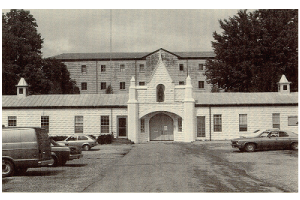
The Gatehouse at the Abbey of Gethsemani
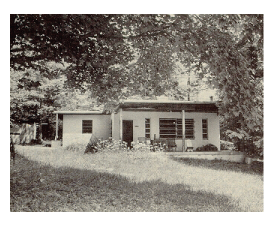
Thomas Merton's Hermitage in Gethsemani, Kentucky
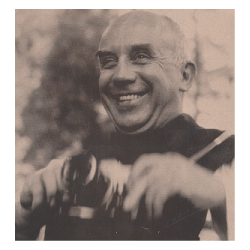
Thomas Merton loved to spend time in the forest around Gethsemani
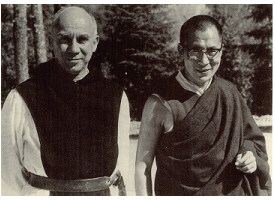
Thomas Merton and the Dalai Lama, 1968
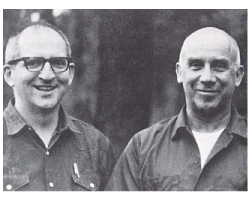
Brother Patrick Hart and Thomas Merton on September 9, 1968
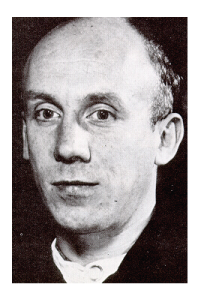
Thomas Merton in 1949, around the time that The Seven Story Mountain was first published
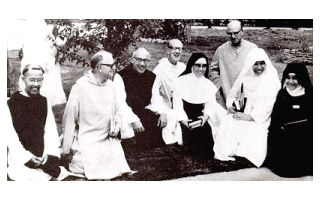
Thomas Merton (center) sits among other participants in the Bangkok conference of Benedictine and Trappist monks
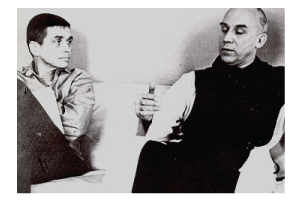
Thomas Merton and Fr. Daniel Berrigan, S.J., a founder of the Catholic Peace Fellowship
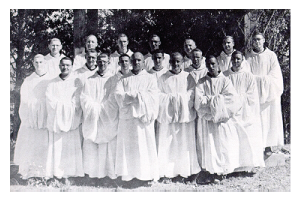
Thomas Merton, the Master of Scholastics, with his class at Gethsemani
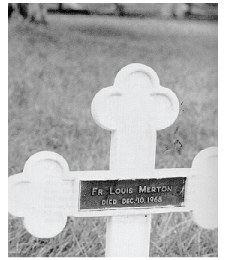
Thomas Merton's gravemarker in Gethsemani, Kentucky
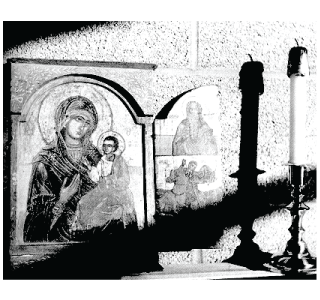
Photograph from the study of Merton's Hermitage at Gethsemani
All About Mary includes a variety of content, much of which reflects the expertise, interpretations and opinions of the individual authors and not necessarily of the Marian Library or the University of Dayton. Please share feedback or suggestions with marianlibrary@udayton.edu.
